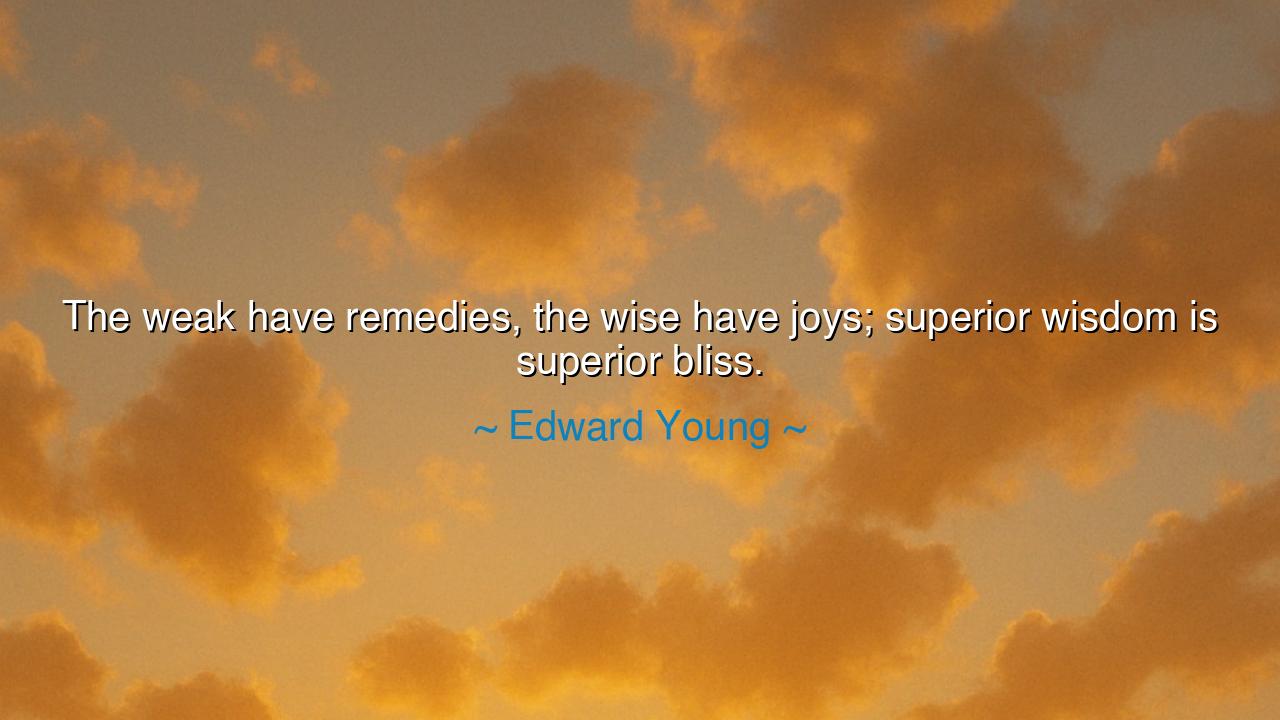
The weak have remedies, the wise have joys; superior wisdom is






The poet Edward Young, voice of the eighteenth century, spoke with lofty vision when he declared: “The weak have remedies, the wise have joys; superior wisdom is superior bliss.” In this, he unveils a hierarchy of the spirit: the weak, who stumble and suffer, seek mere remedies for their pain; the wise, who understand the nature of life, find joys even amid trial; and those who attain superior wisdom rise beyond fleeting pleasures into a state of lasting bliss. It is not the world that changes for such souls, but their perception, their mastery, their harmony with truth.
The origin of this saying lies in Young’s lifelong reflections on mortality and eternity, most famously in his work Night Thoughts. He saw how men, tossed by grief or vanity, clung to cures for passing ailments, whether of body or spirit. Yet the wise discern that true joy does not come from healing wounds alone, but from embracing life with understanding. And those of superior wisdom, who rise above both pleasure and pain, taste the bliss of the eternal—a serenity not dependent on circumstance.
History offers us the shining example of Epictetus, once a slave, lame in body but strong in soul. He had no power to remedy the chains of his youth, yet through the wisdom of Stoic philosophy he found a joy that no master could steal. He taught that while the weak seek remedies for suffering, the wise transform suffering into strength. His life is a testimony that superior wisdom does indeed yield superior bliss, for he found freedom in the mastery of self, not in the absence of pain.
The ancients often spoke of this path. The Greeks called it eudaimonia, the flourishing of the soul, not built on comfort but on alignment with virtue and truth. The Hebrews sang of a joy that endures through the valley of shadows. The Buddhists declared that enlightenment brings liberation from desire and fear alike. All traditions converge on the same truth Young proclaimed: that the weak survive by cures, but the wise live by joy, and the enlightened live in bliss.
Therefore, O seekers, learn to rise through these stages. Do not remain among the weak, forever searching for remedies to soothe each wound. Strive to be among the wise, who carry joy like a lamp into every season of life. And aspire higher still, to the realm of superior wisdom, where the soul tastes eternal bliss, unshaken by storm or sorrow. For this is the crown of wisdom—not the avoidance of pain, but the discovery of joy deeper than pain, and bliss greater than all the fleeting treasures of the earth.






DDDz Dat
From a reader’s point of view, this idea feels both poetic and challenging. It implies that wisdom doesn’t just bring clarity but a kind of lasting happiness that others can’t easily access. Yet, I can’t help questioning whether joy should be seen as a reward for superiority. Isn’t it possible that humility, not wisdom, is what allows us to experience genuine bliss? Maybe joy lies in connection, not intellect.
TYNguyen Thi Yen
I’m intrigued by the contrast between ‘remedies’ and ‘joys.’ It feels like Young is saying that the wise don’t just fix problems—they rise above them. But that sounds almost unattainable in reality. Is it possible to reach a state where understanding itself becomes bliss, independent of circumstances? Maybe true wisdom isn’t about escaping pain, but about transforming it into something that nourishes the spirit.
TThanhhung
This quote makes me think about the relationship between wisdom and emotional resilience. Perhaps those who are wise find joy not because life is easier, but because they understand it better. They can see meaning where others see only struggle. Still, I wonder if this idea risks undervaluing the struggles of the 'weak'—aren’t remedies also part of the human journey toward learning and growth?
NLNhat Nhat Nhat Le
I find this statement both inspiring and slightly elitist. It suggests that wisdom elevates a person beyond suffering, but isn’t that a bit dismissive of human vulnerability? Everyone, no matter how wise, seeks comfort and healing at times. Maybe the difference is that wisdom transforms remedies into acceptance. I’d love to know whether Young believed wisdom shields us from pain, or simply changes how we experience it.
LNLinh Nguyen
This quote fascinates me because it seems to link wisdom directly with happiness. It makes me wonder—does greater understanding truly lead to greater joy? Some would argue that awareness often brings sorrow, especially when you see the flaws and injustices of the world. Maybe Young meant a kind of spiritual wisdom that transcends pain rather than intellectual knowledge. Can we really say the wise are always happier than the ignorant?